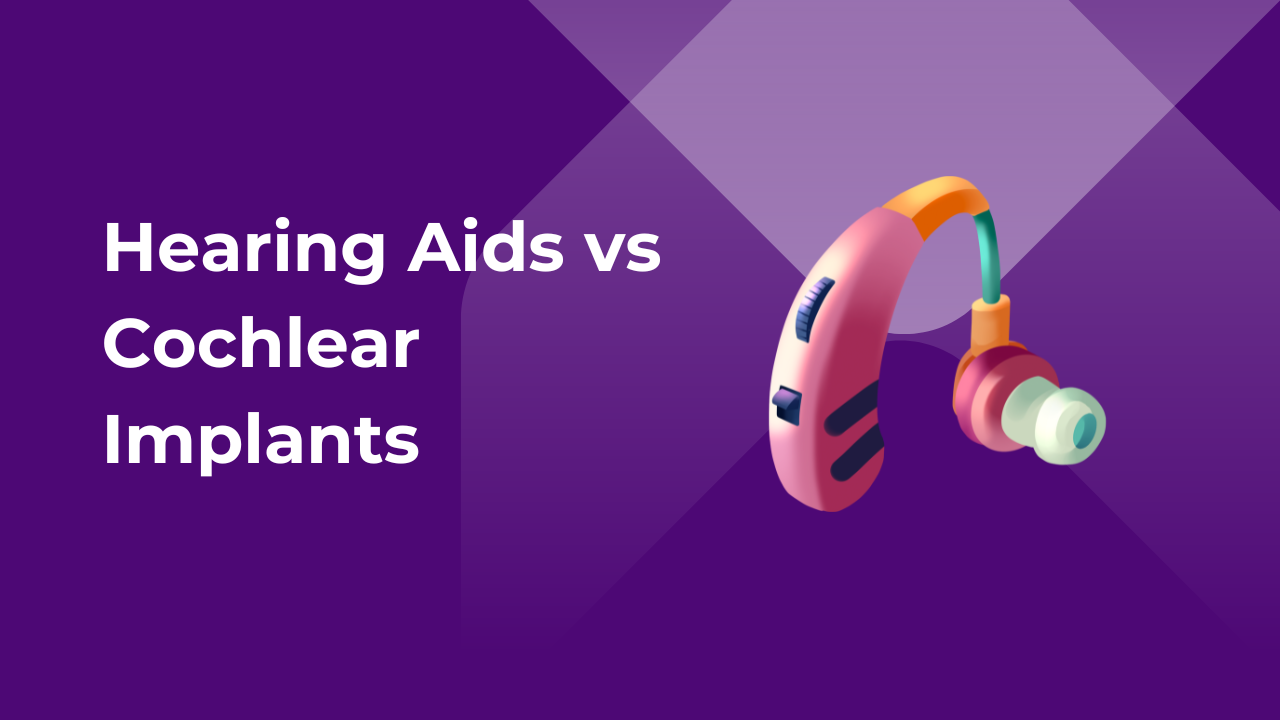Hearing loss can impact your daily life, relationships, and emotional well-being. If you’re exploring solutions to improve your hearing, you’ve likely come across two major options: hearing aids and cochlear implants. But which one is right for you?
In this guide, we’ll break down the differences between hearing aids and cochlear implants, explore their pros and cons, and help you understand which solution may be best based on your hearing condition, lifestyle, and personal preferences.
Hearing Aids vs Cochlear Implants: A Quick Overview
When it comes to treating hearing loss, both hearing aids and cochlear implants serve distinct purposes. While hearing aids amplify sound to make it easier for the ear to process, cochlear implants bypass damaged parts of the ear and directly stimulate the auditory nerve.
Each has its own set of benefits, limitations, and ideal use cases. Let’s explore them in more detail.
What Are Hearing Aids?
Hearing aids are small electronic devices that sit behind or inside your ear. They amplify sounds to help those with mild to moderate hearing loss hear more clearly.
How Hearing Aids Work:
- Microphones pick up sounds from the environment.
- The processor amplifies and fine-tunes the sound.
- The speaker delivers the amplified sound to your ear.
Types of Hearing Aids:
- Behind-The-Ear (BTE)
- In-The-Ear (ITE)
- Receiver-In-Canal (RIC)
- Completely-In-Canal (CIC)
Benefits:
- Non-invasive
- Easy to use and maintain
- Customizable and programmable
- Affordable compared to implants
Who Can Benefit:
- People with mild to moderate hearing loss
- Individuals looking for a non-surgical option
- Those who want a discreet, quick solution
Want to try hearing aids? Visit our Hearing Aid Clinic in Mumbai for a free consultation and test.
What Are Cochlear Implants?
Cochlear implants are advanced medical devices used for individuals with severe to profound hearing loss who do not benefit from hearing aids.
How Cochlear Implants Work:
- An external sound processor captures sound.
- The processor transmits signals to an implanted receiver.
- Electrodes send signals directly to the auditory nerve.
Benefits:
- Bypasses damaged parts of the inner ear
- Can restore hearing in cases where hearing aids fail
- Useful for both children and adults
Surgical Procedure:
- Outpatient surgery to implant the internal device
- Post-surgery therapy for hearing adaptation
Who Can Benefit:
- Individuals with severe to profound sensorineural hearing loss
- People who receive little to no benefit from hearing aids
- Children born with hearing impairment
Hearing Aids vs Cochlear Implants: Key Differences
| Feature | Hearing Aids | Cochlear Implants |
| Type of hearing loss | Mild to Moderate | Severe to Profound |
| Surgical procedure | No | Yes |
| Cost | Lower | Higher |
| Sound processing | Amplifies sound | Stimulates auditory nerve |
| Maintenance | Simple | Requires follow-ups and therapy |
Which Is Better: Cochlear Implant or Hearing Aid?
There is no one-size-fits-all answer. It depends on:
- Severity of hearing loss: If hearing aids no longer help, implants might be the answer.
- Medical evaluation: An audiologist or ENT will recommend the right device.
- Age and cognitive ability: Older adults may prefer simpler options; children may benefit long-term from implants.
- Lifestyle: Active individuals may prefer devices with better noise filtering or waterproof options.
At Crystal Hearing Solution, we provide personalized consultation and hearing assessments to guide you to the right solution. Book a audiometry test in Mumbai today.
Disadvantages of Cochlear Implants
While cochlear implants can offer life-changing benefits, they also come with some limitations:
- Requires surgery and recovery time
- Potential surgical risks (infection, device failure)
- Expensive compared to hearing aids
- Continuous follow-up and rehabilitation needed
- May not restore “natural” hearing fully
Why Do Some People Choose Not to Get Cochlear Implants?
- Cultural identity: Some individuals in the Deaf community view deafness as a cultural identity, not a condition needing correction.
- Fear of surgery: Not everyone is comfortable undergoing a surgical procedure.
- Cost constraints: Despite improvements, cochlear implants can be expensive.
- Satisfaction with hearing aids: For many, modern digital hearing aids offer sufficient clarity.
- Stigma or lack of awareness: Misconceptions about implants may lead to hesitation.
How Crystal Hearing Solution Helps You Choose the Right Option
At Crystal Hearing Solution, we simplify the decision-making process:
- Free diagnostic hearing tests to understand your hearing profile
- Personalized recommendations based on age, hearing loss, and lifestyle
- Trial options for digital hearing aids
- Support for cochlear implant evaluation and referrals
- Ongoing assistance, repairs, and upgrades
Whether you’re just exploring or ready to take the next step, our hearing aid in navi mumbai is here to support you.
Conclusion: Your Hearing, Your Choice
Whether you go with a digital hearing aid or cochlear implant, the most important thing is to take action. Untreated hearing loss can lead to social isolation, cognitive decline, and lower quality of life.
Start your journey with expert guidance at Crystal Hearing Solution. Schedule your free hearing test and consultation today at our trusted Hearing Aid Clinic in Mumbai and rediscover the joy of hearing clearly.





